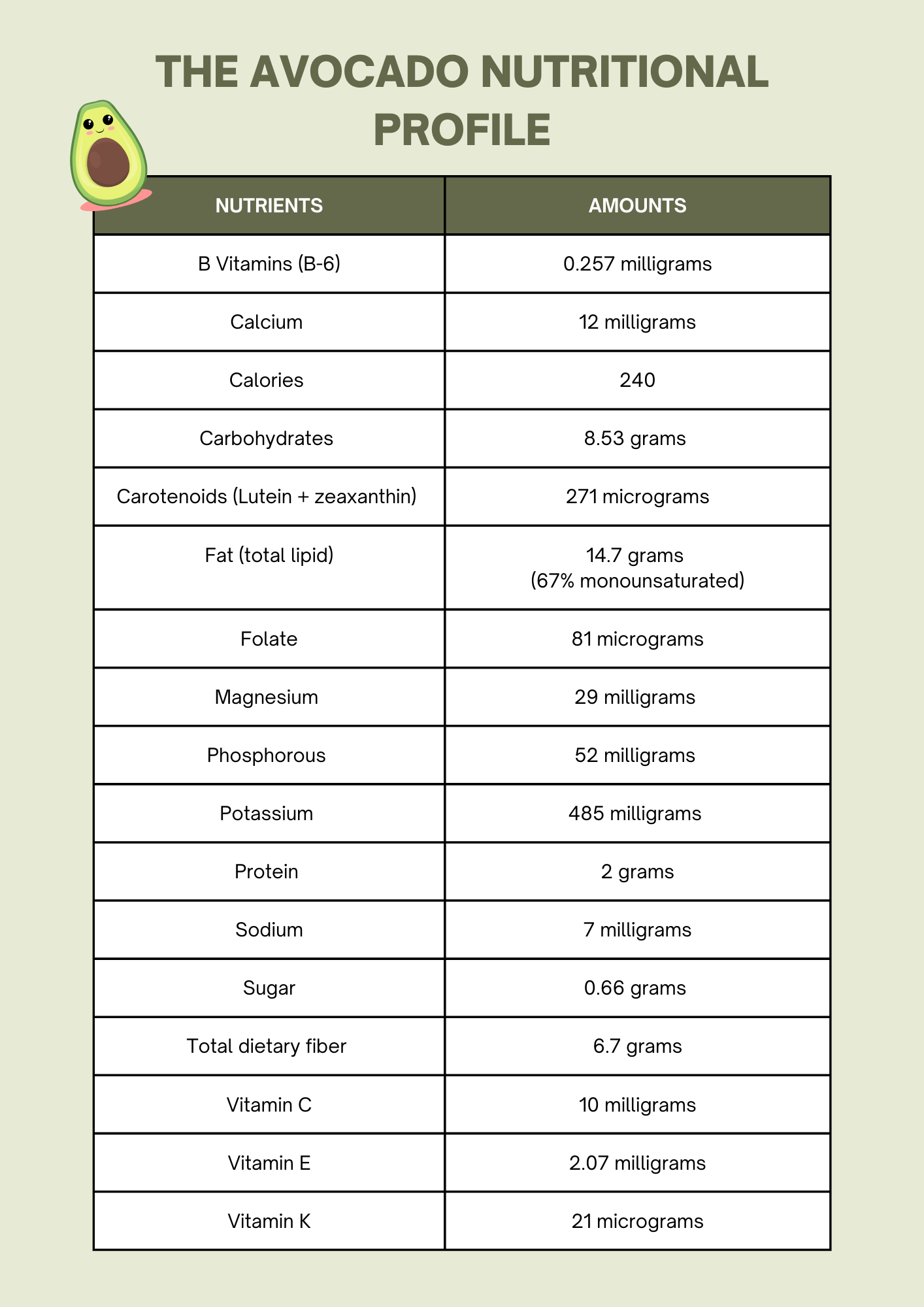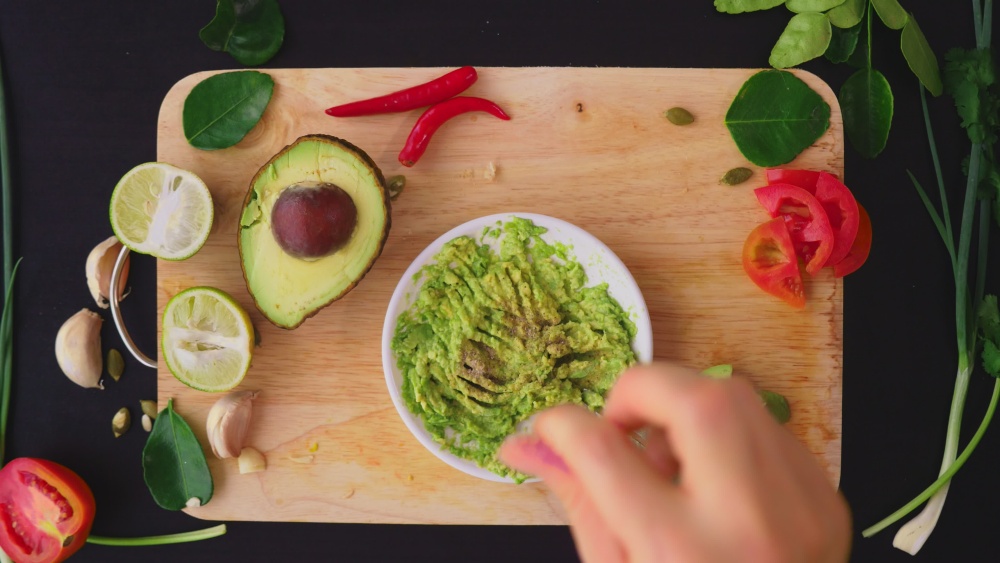Move aside, apples, because there’s a new health-conscious favorite in town that’s ready to steal the spotlight. Enter avocados, the green wonders that can humbly boast about their irresistible taste and creamy texture. But even more so about their health benefits. From promoting heart health to boosting brain function, these nutrient-packed fruits are a delicious addition to your diet that will leave you feeling both satisfied and virtuous. So, let’s peel back the layers and explore the incredible ways avocados can work their magic on your brain health, mental health, and overall well-being.
Avocado, also known as alligator pear, is a bright green fruit that has become popular in recent years. It has a buttery, creamy texture with a mild earthy, grassy, and nutty flavor encased in a bumpy, leathery outer skin.
It is the star ingredient in a wide range of popular dishes, which explains why the consumption of avocado has increased to more than 8 pounds per person in the U.S. alone.
But the taste isn’t this oval-shaped fruit’s only appeal.
Avocados are a good-for-you superfood that’s great to add to most diets. We’ll shed light on its many health benefits, but first, let’s familiarize ourselves with —
The Avocado Nutrition Profile
Avocados are a great source of many nutrients, but they also contain anti-inflammatory and antioxidant compounds that are essential for overall health. Here’s the nutrition breakdown of 100 grams of avocado according to FoodData Central:

Benefits of Avocado
Here are some reasons why you need to include avocados in your diet:
Ensure Bone Health
Just half an avocado can help you meet 25% of your daily amount of vitamin K, an essential nutrient for bone health. It also stimulates antioxidant activity via saponins, which prevents OVX-induced bone loss. However, to cement this claim, research needs to be conducted on human participants to see the full extent of its benefits.
Great for Vision
Avocados contain lutein and zeaxanthin, carotenoids that cross the blood-brain barrier. They act as a blue light filter, protecting your eye tissue from UV damage, and possibly filling the role of antioxidant and anti-inflammatory agents.
Hence, avocado consumption can be crucial for visual function and health.
Help Maintain Healthy Body Weight
Avocados have high amounts of healthy fat and fiber, so they can help you feel fuller for longer which can inhibit food intake. Plus, there is virtually no risk associated with overconsumption so it can be a crucial dietary addition for weight regulation.
Improve Gut Health
According to a 2021 article, incorporating avocados — a fruit rich in dietary fiber and monounsaturated fatty acids — in your diet could help lower fecal bile acid concentrations and increase bacterial diversity (Faecalibacterium, Lachnospira, and Alistipes). Hence, it can reduce intestinal inflammation and enhance your gut health.
It can also reduce the risk of acid-associated tumorigenic activity, lowering one’s chances of getting colorectal cancer which accounts for around 10% of cancers globally.
Keep Cancer at Bay
Avocados contain high levels of phytochemicals like carotenoids, which have a strong chemopreventive and anti-cancer effect across most cancer types.
This fruit also contains very high levels of monounsaturated fats which can reduce your risk for certain cancers, including colorectal, lung, and bladder cancer. Its folate content can suppress some types of cancers during their early stages but it might also play a dual role in cancer initiation and progression.
Prevent Chronic Diseases
A new trial suggests that consuming avocados could reduce the risk of chronic conditions, including visceral adiposity. While the research was conducted by the HASS Avocado Board (which means there’s a risk of bias), the claim actually has a leg to stand on.
According to a 2018 research, eating avocados could:
- Lower body weight and BMI by 3%, increase meal satisfaction by 23%, and drop the desire to eat by 28% — which helps in weight management
- Improve blood lipids and reduce the risk of CVD
- Reduce total cholesterol by 6.5 mg/dL
- Improve postprandial glycemia and insulinemia
- Lower the risk for metabolic syndrome by 50%
Reduce the Risk of Depression
Avocados contain a good amount of folate which prevents the buildup of homocysteine — an amino acid that damages the lining of arteries and promotes blood clots. Since low levels of folate may be a risk factor for depression and homocysteine metabolism can be a cause for cognitive dysfunction and depression, adding avocados to your diet could help put you in a better mood.
Reduce the Risk of Heart Disease
One avocado weighing 173 grams can contain an impressive 132 milligrams of β-sitosterol, a phytosterol that offers protective properties against myocardial I/R injury and other heart ailments by lowering cholesterol levels in the body.
It also decreases the circulation of oxLDL (which can promote atherosclerosis), so eating a diet rich in avocados could reduce your risk for cardiovascular diseases (CVDs).
To top it off, its potassium content relaxes the walls of the blood vessels, which can help decrease your blood pressure and protect against muscle cramping.
Support Maternal and Fetal Health
Avocados contain folate, potassium, and fiber, which can lower the risk of hypertension, dyslipidemia, and gestational diabetes. It can thus improve maternal health while reducing pregnancy and birth complications in certain cases.
Folate is also essential for the growth and development of the fetus. According to the Centers for Disease Control and Prevention (CDC), it helps form the neural tube and can keep anencephaly (underdevelopment of the fetus’ brain and skull), spina bifida (split spine), and other birth defects at bay. Note that this requires an adequate consumption of 400 micrograms for mothers who are of reproductive age.
How To Incorporate Avocado Into Your Diet
Avocados make healthy snacks. Here are 12 delicious ways to enjoy it:
- Add cubed avocados to smoothies, tacos, and burritos.
- Bake avocado fries, and enjoy them alongside dipping sauces for added pizzazz.
- Fill sushi rolls with thin avocado slices.
- Increase the fiber and fat content of your hummus by combining chickpeas, tahini, and EVOO with creamy avocado.
- Pickle avocados with white vinegar, water, and salt. Flavor them with aromatics, spices, herbs, and seasonings.
- Spread puréed avocado on top of toast or sweet potato to give your diet avocado vitamins and minerals.
- Use them in stuffed eggs topped with bacon and sprinkled with spices.
- Substitute mayo with avocados as a binder in salads. You can use it to top chicken breasts for a powerful protein punch.
- Switch bananas with avocados when making your favorite bread.
- Top your soups and stews with avocado slices.
- Use avocados in guacamole flavored with lime, salt, herbs, spices, and vegetables.
- Use avocados to make a dairy-free chocolate mousse or as a sour cream substitute for baked potatoes.
- Make a decadent avocado soup with our unique recipe
Or, you can cut it into chunks, season them to perfection with a pinch of salt and pepper, and drizzle them with EVOO for a simple snack. Just make sure to eat it in moderation, as avocado calories can add up over time.
Conclusion: Avocados — Packed with Flavor and Health Benefits
Avocado is a fruit that delivers lots of flavor and health benefits.
However, keep in mind that avocados are high in vitamin K, which is involved in hemostasis. So, it can decrease the effectiveness of warfarin, an anticoagulant medication that prevents clotting. It’s also a no-no for those with latex allergies.
If in doubt, it’s always best to check with your healthcare practitioner to ensure that you get all of the avocado’s benefits without any undesirable side effects.
More Articles You May Be Interested In:
Processed Foods: Balancing Convenience, Safety, and Nutrition
Today, people are eating more processed food compared to the past few decades—and it’s easy to see why. It’s conveniently available, making it an absolute time-saver in the kitchen. It’s also usually cheaper and tastier than whole, natural foods while offering a...
Benefits of Olive Oil and How To Use It in the Kitchen
Olive oil consumption is steadily increasing, and it’s easy to see why. It’s rich in antioxidants and omega-3s that keep your body in peak health. The oil is particularly beneficial in its least processed form: cold pressed extra virgin olive oil. The widespread...
Mindful Eating: The Moment-to-Moment Experience That Improves Your Quality of Life
Do you watch television or talk to a loved one over text while you eat? Time and again, cognitive science has proved that the human mind is incapable of performing two or more tasks at once. But, living in today’s modern, fast-paced world, we barely notice when we’re...
12 Clever Ways To Healthy Eating on a Budget
Inflation and supply-chain disruptions have caused food prices to shoot up more quickly than in previous decades, making every trip to the grocery a costly and tricky affair. Despite the fact that food has become more expensive than ever, the federal minimum wage...
The power of protein on weight management
Weight management can be a challenging journey for many individuals, but with the right approach, achieving a healthy and sustainable weight is possible. Among the various factors that influence weight loss success, the role of protein cannot be overstated. Protein is...
Is a meat diet healthy?
The impact of meat consumption on health is a complex and debated topic. The vegans will give a compelling argument that meat will kill you. And of course, the “carnivore” (person who primarily eats meat) will give a compelling argument that meat is the healthiest of...
Unveiling the Health Secrets Within: Understanding the Gut Microbiome
The human body is home to trillions of microorganisms, forming a complex ecosystem within our gastrointestinal tract (GIT) known as the gut microbiome. Long overshadowed by the spotlight on human cells, this intricate community of bacteria, viruses, fungi, and other...
Polyphenols: Health Benefits and Food Sources
I have long believed that a diet of fruits, vegetables, and seeds had a positive impact on overall health. A great example are studies looking at people who eat a Mediterranean diet (diet with a high concentration of fruits, vegetables and legumes). The reason might...
Antioxidants: A beginners guide to understanding these powerful chemicals
Cardiovascular disease and cancer are responsible for 44% of deaths in the US. 6.2 million Americans are living with Alzheimer’s disease and nearly 1 million with Parkinson’s disease. All of these diseases have one thing in common, oxidative stress. But there is...
Turmeric: Health Benefits and Food Sources
There is a growing interest in people wanting to take control of their health and “longevity”. With this in mind, curiosity is growing surrounding the best “diet” for overall health and disease prevention. And of course, the jury is still out on whether or not there...











